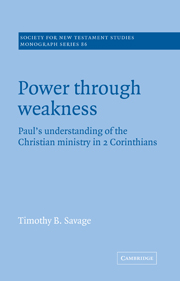Summary
The purpose of this book has been to make sense of Paul's paradoxical teaching in 2 Corinthians and in particular of his description of his ministry in terms of two seemingly contradictory, yet overlapping, experiences – of power manifested through weakness, of glory revealed in shame, of life working through death. We may now briefly summarise our findings and draw a few conclusions.
In the first part of the study we discovered that before we could understand the meaning of Paul's teaching we had first to identify the situation which gave rise to it. This meant coming to grips with the nature of the criticisms levelled against Paul, for it was in response to those criticisms that the apostle imparted his paradoxical instruction.
We learned, first of all, that the Corinthians were evaluating Paul according to the self-exalting standards of their secular environment. They wanted him to be proud and assertive, to boast of his personal exploits, to employ powerful speech, to draw comfort from financial security – in a word, to embody the self-regarding aspirations of their culture. By making these demands on Paul they demonstrated that they were assimilating their idea of a minister of Christ to the egocentric norms of their society. Not surprisingly, they were dismayed by Paul's humility – or, as they put it, his ‘weakness’ – and it caused them to wonder whether he was really a minister of the exalted Christ.
- Type
- Chapter
- Information
- Power through WeaknessPaul's Understanding of the Christian Ministry in 2 Corinthians, pp. 187 - 190Publisher: Cambridge University PressPrint publication year: 1995

